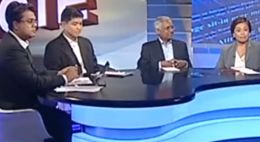S'pore govt 'blunderbuss' licensing law unnecessary

SINGAPORE--The government has little reason to introduce its new licensing scheme for online news sites when the mainstream media and online community already demonstrate responsible reporting and self-regulating.

During a panel discussion last night broadcast on Channel NewsAsia, Professor Arun Mahizhnan, special research adviser at the National University of Singapore's Institute of Policy Studies, noted the government's mandate for news sites to apply individual licenses lacked clarity and should have been drafted more precisely.
The Media Development Authority of Singapore (MDA) last week said online sites reporting on local news at least once a week and drawing 50,000 unique visitors per month would have to apply for a license. It defines news as content carrying any "news, intelligence, report of occurrence, or any matter of public interest, about any social, economic, political, cultural, artistic, sporting, or scientific or any other aspect of Singapore in any language--whether paid or free".
It was this definition that Mahizhnan took issue with and questioned the need for such "blunderbuss legislation". "[The Internet] is a space that's not only new but somewhat sacred in the sense that the old media space has been bottled up for a long time. So people who have come into the Internet space don't want the same thing to happen again.
"It can also be seen as a slippery slope. You take one step and then the next steps will follow. There's a pattern in all of this so the public response is understandable," he said, pointing to the public outcry from the online community following the announcement last week.
Bertha Henson, editor of local blog site The Breakfast Network and also a panelist in last night's discussion, also noted the absence of public feedback and consultation in implementing the new ruling. "It's seen as a constraint of the Internet space because the Internet community hasn't been consulted prior to it. So it makes a monkey out of the whole transparency and engagement exercise the government is so 'hot' about.
"If you can't even engage the most vocal parts of the community and proceed to just throw this down on them, of course they'll see this as a way to clamp down on freedom of expression," she said.
Acting Manpower Minister Tan Chuan Jin, who sat in the panel discussion, reiterated MDA's clarification in the days after the licensing framework was first announced that the ruling applies specifically to news sites and does not encompass individual blogs and commentaries. However, he added that whether the rule would apply to blogs that morph to become news sites is "something we need to look at".
Mahizhnan said the interpretation of what constituted as "news sites" was left primarily to the regulators, and noted this was a legitimate concern among the online community.
Tan responded by pointing to the infrequent use of the regulations, adding that many sites critical of government policies continue to operate today. According to the government, since 1996, there have been 24 cases where it instructed the removal of objectionable content. In the last two years, there had been only one case involving the removal of a video MDA deemed capable of inciting religoius hatred.
Tan further reiterated the government's intent was not to control the online space, but to extend existing regulations and policies which already applied to print media and bring them on par with online news sites. The new licensing rule was necessary to ensure a level of responsibility from those reporting local news, he said.
However, both Henson and Mahizhnan pointed out the list of 10 sites which MDA had said would require a license were online entities which were deemed mainstream and to already adopt responsible reporting.
Tan agreed there was already self-policing among the online community, but said the regulations would allow local authorities to deal with issues when they occur and ask Web sites to take down inflammatory content.
He added that the online space would be difficult to control. "It's not possible, nor should we try. It'll be a futile effort and we should respect that space," Tan said.
Mahizhnan then called for the Singapore government to afford more trust to its population and reduce, rather than increase, regulation. "I wonder if the government should really move away from a nanny state mode to a new position where it trusts the citizenry, and it gives them the chance to do it right.
"And when they don't do it right, you can move [to regulate], and in the Singapore context, you can move in very swiftly and very decisively. You have enough reserve powers with so many other pieces of legislation, so people are wondering why this [implementation of the licensing framework]," he said.
He asked if the new ruling was the result of the government's apprehension and move to reempt foreign players which might not be as responsible.
Mahizhnan also noted the difficulty of enforcing regulations beyond local shores. "The fundamental point of the Internet [is that] it is no respecter of national boundaries or national laws. We can easily cross these boundaries. [What] if there's a recalcitrant blogger or commentator, what can you do with your regulation?"
While the licensing rule currently applies only to local-based Web sites, Minister for Communications and Information Yaacob Ibrahim had said the Broadcasting Act will be further amended next year to include overseas-based news sites targeting the Singapore market, giving the government power to apply the licensing framework on these sites.
Tan acknowledged it would be tough to regulate overseas sites, but added the government would still need to explore "what makes sense", implement some form of light regulation, and look at whether it can be practically extended beyond the borders.